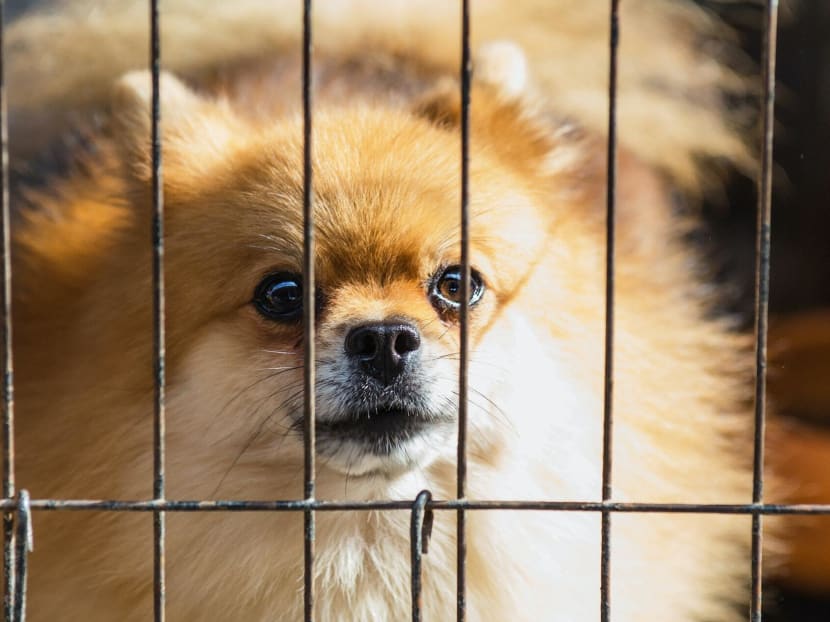AVS seeks public feedback before finalising stricter rules for dog breeders and pet boarders
SINGAPORE — By the middle of next year, dog breeders and pet boarders may be subject to stricter regulation as the authorities put in place new licensing rules.

New licensing conditions for dog breeders and pet boarders are expected to be finalised in the fourth quarter of 2021.
- The authorities are seeking public opinion on a new set of licensing conditions for pet breeders and boarders
- Some of the changes are to enhance welfare of breeding dogs
- For pet boarders, rules will extend to cover facilities on commercial properties
- The regulations are targeted to take effect in the second quarter of 2022
SINGAPORE — By the middle of next year, dog breeders and pet boarders may be subject to stricter regulation as the authorities put in place new licensing rules.
The Animal and Veterinary Service (AVS) is starting a second round of public consultation to seek feedback before finalising the rules, after a review to raise the standards of animal health and welfare began in August 2019.
It announced at a virtual press conference on Thursday (July 1) that it is aiming to finalise the licensing conditions in the fourth quarter of this year and for them to take effect sometime in the second quarter of next year.
Some of the proposed changes are related to regular health checks for the animals, stringent record-keeping and improving the welfare of breeding dogs.
For example, in-breeding of dogs will be prohibited and all breeding dogs above six years old must be retired and sterilised within six months after retirement.
Breeders must also provide opportunities for social interaction and enrichment for their animals, such as interaction-based activities at least once a day.
They must keep comprehensive records of the animal movements, veterinary treatments and health of all breeding dogs and litters.
The breeding of dogs with known harmful heritable conditions will not be allowed.
For pet boarders, a specific set of licensing conditions will extend to cover boarding facilities on commercial properties and to cover more animals such as cats and other small mammals. Workers running the facilities must also undergo training.
Under the revised licensing conditions, daily health checks will be required of animals that are boarded.
The boarding of unlicensed animals or animals with transmissible diseases will be prohibited.
PET SECTOR REVIEW
The review of the pet sector came after notable incidents at boarding facilities in 2019.
In January that year, a Shetland sheepdog died while being boarded at Platinium Dogs Club.
In April the same year, a maltese died in a swimming accident at Sentosa while under the care of Board N' Play, a boarding company.
AVS said that its engagement with key stakeholders in the pet sector showed that there were concerns over the varying standards of pet breeders and boarders.
It then carried out a round of public consultation and held discussions with stakeholders including veterinarians, animal welfare groups, dog trainers, breeders and boarders.
The revisions of the licensing conditions take reference from standards from other countries, including the United Kingdom and Australia, it added.
At present, home breeding, especially with the intention to sell the animals, is not allowed.
Boarder-specific regulations, which for now apply only to boarders operating on farmland, will also apply to those operating in approved commercial premises under the new set of rules.
AVS estimated that there are about 50 commercial pet boarders that will need to be licensed when the new regulations are set.
However, certain breeding and boarding activities that are done on a small scale or on a personal and non-commercial basis will not fall under the licensing conditions.
For example, they will not apply to a person who helps board a small number of animals on a personal and infrequent basis for family and friends, without any advertising.
“Pet breeding and boarding facilities will be subject to licensing based on the scale of their operations, which depends on factors such as the number of animals handled and the frequency of transactions,” AVS said.
At the virtual conference, Mr Tan Kiat How, Minister of State for National Development, said: “With the rise in pet ownership in Singapore, I am sure members of the public will be keen to have a say in how their pets are bred and boarded.”
“I encourage the public to share their views with us via the online consultation.”
WHAT ANIMAL WELFARE ADVOCATES SAY
Dr Jaipal Singh Gill, executive director of the Society for the Prevention of Cruelty to Animals (SPCA), welcomed the elevation of standards, but cautioned that certain aspects of the licensing conditions may be harder to monitor.
“For the breeding industry, the (licensing) conditions state that the breeder must provide social interaction and enrichment, but this is very difficult to monitor and enforce... as they largely operate behind closed doors,” he said.
Dr Gill also expressed concern about people who breed animals at home and put them up for sale.
“We would definitely want the new regulations to address this loophole, so that those breeding for profit cannot charge a commercial rate and call it an adoption fee.”
Echoing his sentiments, Ms Anbarasi Boopal, co-chief executive officer of the Animal Concerns Research and Education Society (Acres), said: “If unlicensed small-scale breeders are not covered under the licensing system, the backyard breeding and online sales — and resulting abandonment and poor welfare — will continue to remain an issue in Singapore.
“The areas listed under the proposed standards for licensed breeders are basic animal welfare conditions and they must be applied for all breeders, whether small-scale or not,” she added.
After the new standards are finalised, breeding and boarding businesses will be given six months to make the necessary adjustments before the full conditions are enforced.
The public consultation will be held until July 31. Members of the public who are keen to share their views may do so on AVS’ webpage at https://go.gov.sg/bnb.









